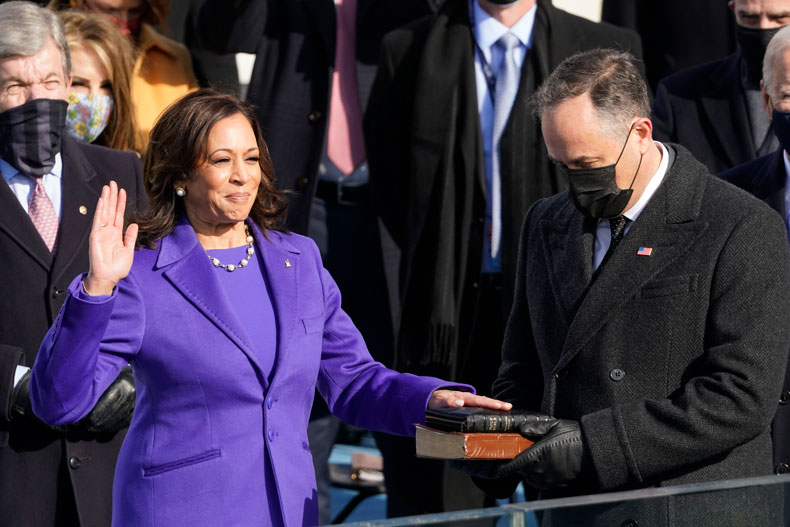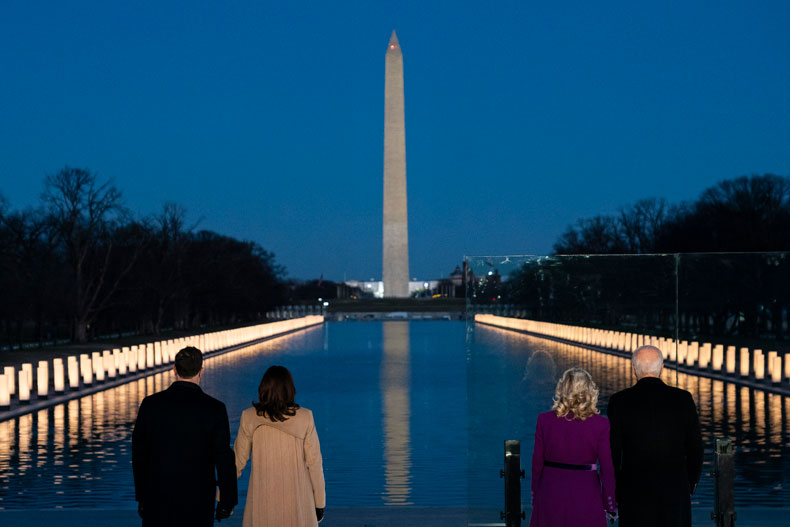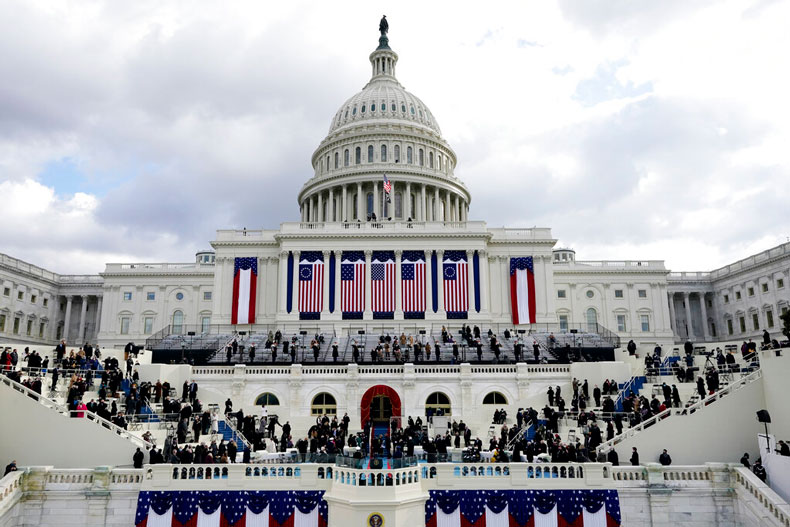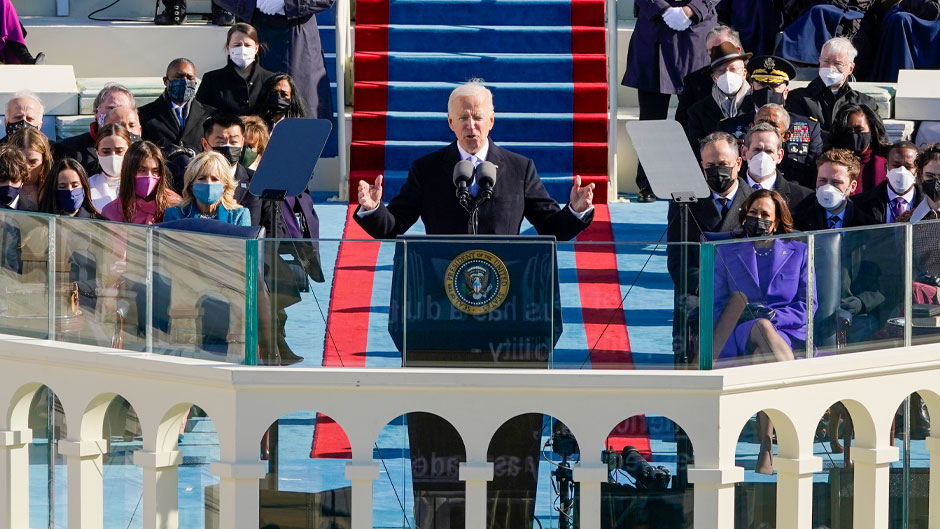With the U.S. death toll from the coronavirus at 400,000 and counting, an economy in free fall, and a country still deeply divided by race and politics, Joseph Robinette Biden Jr. was sworn in as the 46th president of the United States on Wednesday, vowing in his inaugural address to “press forward with speed and urgency” to defeat the intractable problems that now beset the nation.
“Few people in our nation’s history have been more challenged or found a time more challenging or difficult than the time we’re in now,” Biden said.
“A once-in-a-century virus that silently stalks the country has taken as many lives in one year as America lost in all of World War II. Millions of jobs have been lost. Hundreds of thousands of businesses closed. A cry for racial justice some 400 years in the making moves us,” he said.
In his inaugural address, Biden called for unity, saying that with it, the nation could accomplish “great things,” from putting people back to work, teaching children in safe schools, defeating the pandemic, making health care secure for all, and delivering racial justice.
It was an inauguration like no other, held in a heavily fortified city with thousands of armed National Guardsmen on patrol. Only two weeks ago, the Capitol Building was a scene of chaos when hundreds of Trump supporters overran barricades and breached the historic building, delaying the certification of the election results.
And rather than the massive crowds that usually descend upon the capital to witness the peaceful transfer of power, Biden’s inauguration was a scaled down version of what the nation is accustomed to seeing. Tens of thousands of U.S. flags stood on the National Mall, representing the American people who could not attend the ceremony because of the raging pandemic. A public art display at the Mall featured 56 pillars of light to represent the 50 states and U.S. territories.
The ceremony also marked the swearing in of Kamala Harris, the first woman, first Black person, and the first person of South Asian descent to hold the vice presidency.

President Biden enters the Oval Office facing a daunting list of challenges, and he has pledged an aggressive agenda for his first 100 days in office. He plans to build support for his recently unveiled $1.9 trillion economic rescue package, which includes $1,400 stimulus checks, to rejoin the Paris Agreement on climate change, and to administer 100 million doses of the COVID-19 vaccine.
And he promised to “press forward with speed and urgency, for we have much to do in this winter of peril and significant possibilities,” he said.
University of Miami’s leading scholars in fields ranging from business and law to health care and education weigh in on the challenges that confront the new administration. They share their views, concerns, and expectations.
Congressional Agenda
Gregory Koger, professor and chair, Department of Political Science, College of Arts and Sciences:
I expect the Biden administration to push an ambitious legislative agenda in Congress. Several of the major Democratic policy goals require new laws, not administrative actions by the president alone. These include increased funding for the COVID-19 crisis, improving the national health system, increasing the minimum wage, and combating climate change. At present, it seems likely that the U.S. Senate poses the greatest challenge for this agenda. After the Democrats' twin victories in Georgia's runoff elections, the Senate party balance is tied with 50 Republicans and 50 Democrats (including two “Independents” who work with the Democrats), with Vice President Kamala Harris breaking the tie in the Democrats' favor. Still, the rules of the Senate require 60 votes to pass most legislation. And even when a simple majority suffices (for example on budgetary legislation), it may be difficult to rally the entire Democratic caucus around a single bill.
Climate Policy
Ben Kirtman, professor of atmospheric sciences and director, Cooperative Institute for Marine and Atmospheric Studies (CIMAS), Rosenstiel School of Marine and Atmospheric Science:
The incoming Biden administration is laying the groundwork for climate policy that will be transformative. For example, the U.S. will rejoin the Paris agreement—this will reestablish our international role in leading greenhouse gas emission reductions. For the first time there will be a U.S. climate czar, former Secretary of State John Kerry, on the National Security Council directly reporting to the president. This clearly establishes climate change as a national security challenge that requires comprehensive solutions across mitigation (i.e., reducing emissions) and adaptation (i.e., responding to the changes in climate that we have already committed to). The Biden administration has also introduced goals of carbon-free electricity generation by 2035 and net-zero emissions by 2050. These are laudable and achievable goals with aggressive use of wind and solar energy generation, which should be popular across the political spectrum. But the implementation details need to be fleshed out. The Biden administration has also committed to partnerships with state and local governments in developing and implementing long-term holistic adaptation strategies that will help South Florida respond to the challenges of sea-level rise.
COVID-19 Pandemic
Susanne Doblecki-Lewis, associate professor of clinical medicine and clinical director, Division of Infectious Diseases, Miller School of Medicine:
With the appropriate resources and public health leadership, the goal of 100 million vaccinations in the first 100 days is achievable. In fact, it is critical that the rollout occur on an aggressive schedule such as this. We need to have vaccines deployed quickly to have a significant short-term impact on COVID-19 case numbers and decrease deaths.
Erin Kobetz, vice provost for research and scholarship and professor in the Departments of Medicine, Public Health Sciences, and Obstetrics and Gynecology, Miller School of Medicine:
If we can dream it, we can do it. Biden is proposing a population-based solution for a public health problem. This is exactly how COVID-19 prevention should be managed—on the appropriate scale to make a measurable impact. The more people immunized, the quicker we will be able to reduce the potential for community transmission.

Diversity
Osamudia James, professor of law and Dean's Distinguished Scholar, and associate provost for diversity, equity, and inclusion, on the importance of diversity on the Biden cabinet:
An obvious reason diversity is important is that diversity of perspectives produces better outcomes. Social science literature suggests that when groups are constructed in ways that maximize various viewpoints and experiences, groupthink decreases. And creativity in production and problem-solving increases. It is also important, however, to remember the ways in which diversity enhances democracy and promotes justice. Given the history of white supremacy in the United States, for example, it is important that whites learn their monopoly on resources, opportunities, and power, is illegitimate—democracy cannot properly function otherwise. It's important we all learn that no one group has an exclusive claim to democratic outcomes. The right of belonging, of citizenship, must not be denied to groups because of their identity, be it race, gender, sexual orientation, religion, class, or immigration status. Finally, a system that consistently excludes and marginalizes groups of people from the opportunities and experiences that ensure security and stability in the United States cannot call itself a democracy. That is, diversity is also a matter of justice in a democratic project. More than just aesthetics, diversity is a commitment to access and representation that allow us all to share in the potential and promise of America.
Education
Laura Kohn-Wood, dean and professor, School of Education and Human Development:
Biden has already made a statement regarding education-related priorities by choosing a leader who is relatively new to leadership but clearly focused on K-12 and issues of access, equity, closing achievement gaps, and assisting English language learners. Further, the fact that Dr. Miguel Cardona is a former public elementary education teacher and principal has been joyously received by educators and those who worry about the current state of public education, which has been a bulwark of our democracy for hundreds of years but has been underfunded and undercut by high stakes testing, misplaced accountability metrics, and the lack of respect and a decent living wage for many teachers. That said, it is unclear how Dr. Cardona will approach the many areas of higher education that were affected by controversial decisions from the previous cabinet leader—or whether or not Dr. Cardona will be able to navigate the difficult matters related to education during the pandemic. He has been described, however, as a leader who seeks input from a variety of stakeholders and one who engages in collaborative decision-making processes. He has invoked his lived experience as an American barrio-born Latinx student who learned to speak English in school and who was a first-generation college student.
Economy
Paulo Leme, executive in residence professor of finance, Miami Herbert Business School:
The pillars of the incoming Biden administration will be heal, repair, and clean up. There is no recovery and jobs without a science- and management-based health program to test, immunize, and safely reopen the economy. Repairing the economy will require New Deal-sized fiscal stimulus to assist those who have suffered the most and reconstruct sectors, which are about to or have already gone bankrupt. This will require fiscal stimulus and laser-guided policies to rebuild businesses and infrastructure and restore jobs and real wages. The massive expansion of government and corporate debt required to rebuild the economy will have to be cleaned up through a combination of higher taxes, higher inflation, and a weaker dollar. I am optimistic about the economy and markets because President Biden has put the most experienced and knowledgeable civil servants in the right seats for what has been, so far, a difficult journey indeed.
Foreign Policy
Joaquín Roy, Jean Monnet Chair and director, European Union Center:
Biden needs to prioritize the relationship with the EU by approving the Transatlantic Trade and Investment Partnership and reinforcing the mutual and global agenda for the defense of human rights and regional integration as a guarantee for peace.
Gender-based Violence
Caroline Bettinger-López, professor of law and director of the Human Rights Clinic, on Biden's plans to address gender-based violence:
Joe Biden and Kamala Harris face a seemingly-impossible challenge, battling pandemic upon pandemic—COVID-19, racial injustice, gender inequality, a climate crisis, and a global economic recession that has deepened food and housing insecurity and is literally killing vulnerable populations. Gender-based violence has surged during the COVID-19 pandemic. And according to the National Women’s Law Center, of the 140,000 net jobs lost in December of 2020, 100 percent were women’s jobs. As Joe Biden’s previous White House Advisor on Violence Against Women, I have total confidence in this White House’s ability to multitask and place a laser-sharp focus on uniting our country while protecting the rights and lives of people who lack power and resources in our society. Joe Biden was made for this moment. His message of unity and soul-searching is critical to address existential threats to our democracy, our health and livelihoods, and our climate.

Health Care
Steven G. Ullmann, chair of the Department of Health Management and Policy, and director of the Center for Health Management and Policy:
Health care has always been a major area of focus regardless of political affiliation. So, what may we expect going forward? First and foremost, COVID-19. With the realization that one requires a minimum 70 percent of the population to be vaccinated, and the realization that current science requires two doses, this means 231 million people vaccinated or 462 million doses. Production may be occurring, but supply chain is a whole different issue. Supply chain in health care is one of those areas of expertise in the Miami Herbert Business School at the U and will be a critical aspect as we go from laboratory to an actual shot in the arm, especially in areas with less access. A second area of focus will be to expand access to health care in general in a cost-effective manner across the U.S. We may anticipate a focus on maintaining our own private health insurance structure but allowing, not for “Medicare for all” but “Medicare for more,” including affordability for those with limited financial means. As always, the “political” in the political economics of health will be of significant interest and importance going forward.
Immigration Reform
JoNel Newman, professor of clinical legal education and director of the Health Rights Clinic at the School of Law, on the challenges President Biden faces on immigration reform:
The incoming administration has evidenced an understanding of the urgency of addressing immigration issues, and a commitment to treating immigrants humanely. President Biden’s proposed immigration reform legislation will take time and legislative will to become a reality. Here are some inequities that can be resolved today by executive action: Hundreds of thousands of lawfully present immigrants currently live in fear and limbo as a result of the former administration’s cancellation of Temporary Protected Status to war-torn and disaster-weary countries. Law abiding young Americans, who arrived as children and have never known another country, have been denied the opportunity to apply for “Dreamer” status. Poor and elderly lawful residents can no longer afford to apply to become naturalized citizens because of fee increases and unfair changes to the fee waiver process. Terrified asylum-seekers are forced to live in unsafe refugee camps on the Mexican border. Let us hope each of these problems can be solved today.
Relationship with the Media
Joseph B. Treaster, professor, School of Communication:
Joe Biden will surely have a better relationship with the press than Trump. Biden regards a free press as a pillar of democracy. He will try to be seen in a favorable light. Sometimes he might withhold information. But I don’t think he’s going to be denigrating reporters or blaming them for whatever goes wrong in America. Biden seems like a decent man and more presidential every day.
Capital Punishment
Scott Sundby, professor of law and Dean's Distinguished Scholar, on President Biden's desire to eliminate capital punishment at the federal level and to incentivize states to follow that example:
The Trump administration chose to mark the close of its term by carrying out three times more executions of federal prisoners in the final six months of its tenure than had been carried out in the prior six decades. If President Biden wants to send a message that his administration is moving away from the politics of fear and racial injustice, few actions could more poignantly serve as the messenger than following through on his pledge to end the federal death penalty. He could begin by instituting a moratorium on executions and by having the Department of Justice decline to pursue death sentences in pending or future cases. Congress would then need to take up legislation to abolish capital punishment. While opposition to the death penalty during the ’90s was the proverbial third rail of politics, the public’s growing awareness of capital punishment’s deep flaws—from the sentencing of innocent individuals to Death Row to inherent racial inequities—has dramatically changed the landscape. Whether a sufficient number of Republicans would vote to repeal the federal death penalty remains to be seen, but that the question can seriously be asked is itself a vivid reflection of how national sentiment is moving toward abolition.
Craig J. Trocino, director, School of Law Innocence Clinic:
President Biden’s ability to stop federal executions and eliminate the death penalty should not be overlooked. A November 2020 Gallup poll indicates that support for the death penalty is lower than it has been in the last 50 years. Currently, half the states have abandoned the death penalty, with 22 states outlawing it and three states having moratoriums in place. President Biden must unequivocally break from the Trump administration, which executed 13 people in the last six months, more than all federal executions in the previous five decades combined. Six of these executions occurred after Trump had lost the election, with one being forced by an extraordinarily rare Supreme Court ruling just four days before Biden’s inauguration. The pace at which the Trump administration pushed for these executions is alarming under normal circumstances. However, doing this during a global pandemic while being a lame duck is cruelty personified. Time and again the criminal justice system has shown the public that the wealthy and powerful escape punishment while the poor, marginalized, and voiceless face the most severe penalties including death. President Biden can draw a stark line in favor of humanity and justice and leave behind the barbarism of the death penalty that so disproportionately condemns the least among us.
Space Program
Victoria Coverstone, professor and chair of mechanical and aerospace engineering in the College of Engineering, on how the space program will fare under the Biden administration:
President Biden has remained relatively silent on his priorities for NASA and his nominee for NASA administrator. I believe that he will increase support for NASA’s earth observation programs, especially those related to climate change. However, the Artemis program’s goal of returning to the moon with the first woman may receive a lower priority since the Artemis program is associated with the Trump administration.
—News@TheU writers Robert C. Jones Jr., Maya Bell, Barbara Gutierrez, Michael R. Malone, and Janette Neuwahl Tannen contributed to this report.

